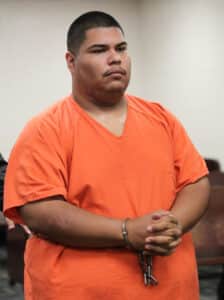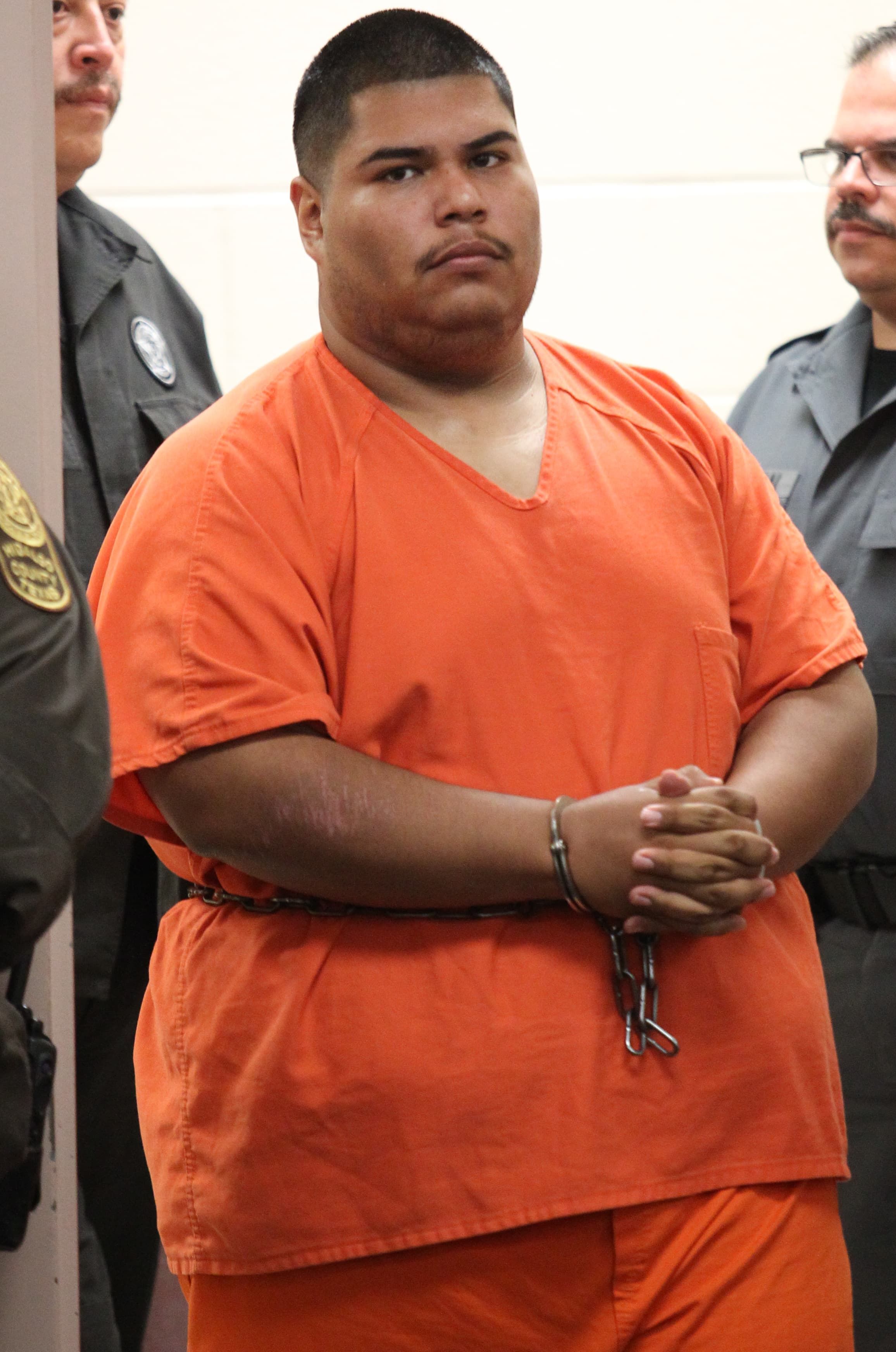
Matthew Lee Sepulveda, the onetime Progreso police officer who in March 2021 was convicted of sexually assaulting two young men he had taken into custody, wants his conviction overturned.
Sepulveda makes several claims in the brief his defense attorney, Carlos A. Garcia, filed in the Fifth U.S. Circuit Court of Appeals last year.
On Tuesday, Garcia stood before a three-judge panel in the New Orleans-based appellate court to argue why Sepulveda — whom he began representing during the sentencing phase — should get a new trial.
SUPPRESSED EVIDENCE
The most potent of Sepulveda’s claims, Garcia argued, is that federal prosecutors suppressed evidence which impeded his ability to defend himself. He also claims that, once the evidence came to light, the judge erred in denying Sepulveda a new trial.
“As the court is well aware, AA had been arrested for sexual assault,” Garcia said about one of Sepulveda’s victims who was arrested six months after Sepulveda assaulted him.
“AA” was 17 years old when Sepulveda assaulted him on June 30, 2019. The former cop had sexually assaulted another victim, then-20-year-old “CL,” just 30 hours earlier, according to prosecutors.
“Defense counsel did not become aware of (AA’s arrest) until after the verdict. Then, after the verdict… (we) filed a motion for a new trial… as it relates to his Sixth Amendment right,” Garcia explained to the appellate panel at the top of the 15 minutes he was allotted to present his arguments.
The Sixth Amendment guarantees a defendant’s right to confront his accuser, but Sepulveda had been unable to do that. The suppression of AA’s arrest prevented Sepulveda from impeaching AA’s credibility upon cross-examination, Garcia argued.
U.S. District Judge Randy Crane denied the motion for a new trial, citing that AA had merely been accused of a crime, not convicted of one.
The appellate judges appeared to agree with Crane’s assessment that — even if the defense had known about AA’s arrest before trial — the jury likely wouldn’t have heard about it because criminal allegations alone are not admissible.
“What is your best-case applying Kyles… that would actually reverse a conviction because of a missed impeachment question opportunity?” U.S. Circuit Judge Stephen A. Higginson asked.
The appellate judge was referring to a 1995 Supreme Court ruling which held that a conviction must be overturned if the suppressed evidence “raises a reasonable probability that its disclosure would have produced a different result at trial.”
Even if the jury had known of AA’s arrest, would that have changed their verdict given the rest of the evidence in the case?
Garcia argued it may have and that — of the two guilty verdicts — the penalty for being found guilty of assaulting AA carried heavier consequences.
That’s because Sepulveda faced a maximum of just 12 months in federal prison for the misdemeanor sexual assault of CL. However, for AA, whom Sepulveda was found guilty of sexually assaulting and kidnapping — a felony — he faced up to life in prison.
DUTY TO DISCLOSE
The 1995 Supreme Court decision also made clear that prosecutors have a duty to disclose evidence favorable to the defense — even if law enforcement fails to bring that evidence to the government’s attention.
In this instance, Assistant U.S. Attorney Sarina S. DiPiazza — the prosecutor who tried the case — didn’t learn of AA’s arrest until the day after Sepulveda’s verdict.
The appellate judges found that incredulous.
“As an officer of the court, knowing this record, you’re telling me the lead victim that the FBI had been talking to and the (prosecutor) had been preparing, nobody in the federal government knew that the victim had been arrested?” Higginson asked.

Assistant U.S. Attorney Jessica C. Akins, who spoke for the government during Tuesday’s hearing, replied they had not.
A moment earlier, she had acknowledged the gravity of the mistake.
“It’s a regrettable oversight. I’m not here to say that this was our best day. This is not the way that we practice law. It was a regrettable mistake,” Akins said.
But she went on to explain the unusual role the pandemic had played in causing the error.
Sepulveda committed his crimes and was arrested in 2019. Just a few months later, the COVID-19 pandemic wreaked havoc on the court system, forcing some eight postponements of his trial.
In January 2020, AA was arrested on a charge of sexual assault of a minor, according to Hidalgo County jail records.
By the time Sepulveda’s case moved forward in March 2021, DiPiazza never specifically asked AA again if he had been arrested for anything.
“We do have an ongoing duty, but she never circled back to ask those important questions again,” Akins said.
Nor would DiPiazza have learned of AA’s arrest had his mother not disclosed the pending charges to a federal victims coordinator, who then informed prosecutors.
On March 23, 2021 — nine days after Sepulveda’s conviction — a Hidalgo County grand jury no-billed AA. They found insufficient probable cause to move forward with charges against him.
CONSEQUENCE OF SILENCE
Sepulveda’s appeal also lobs two additional allegations of wrongdoing during trial by Crane.
The former cop claims the judge held his silence against him — in violation of his Fifth Amendment rights. Sepulveda further claims Crane erred in ordering him to pay $10,000 in restitution to CL.
Garcia pointed to comments Crane made during a July 2021 sentencing hearing.
When Crane asked if Sepulveda wanted to speak, he replied simply, “No comment.”
Sepulveda alleges Crane used his silence to make an “adverse inference” that led the judge to hand down a stiffer sentence.
“I’m disappointed that you didn’t take the opportunity at least to apologize or show any empathy towards what happened to these young men,” Crane said to Sepulveda after announcing the imprisonment term.
But the appellate prosecutor rebutted that theory by noting that the judge had, in fact, made what’s known as a “downward departure.”
Rather than sentence Sepulveda to the maximum of life in prison, Crane chose a term of 30 years.
It was a sentence he hoped would be punitive but not excessive — one that would serve to deter other law enforcement from similarly breaking the public’s trust.
“Here, the Court considers the extreme conduct, the very serious offense… The Court also tempers that with considering the youth of Mr. Sepulveda and what a life sentence means to a 25-year-old,” Crane said.




